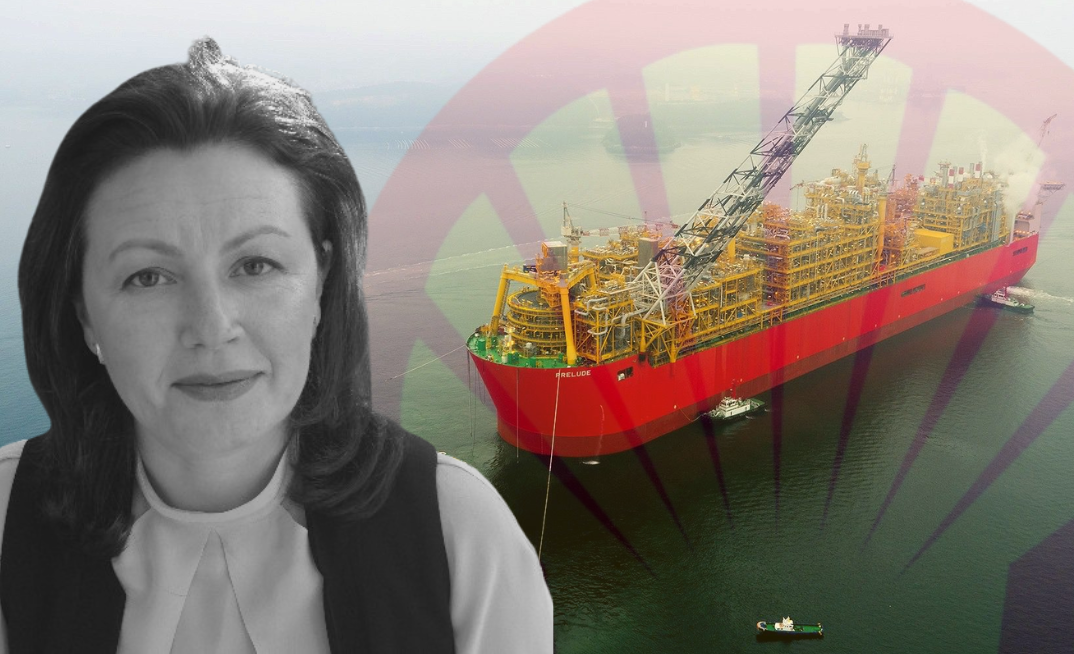Once a rising star at Shell's London headquarters, Irina Woodhead claims she was fired by the oil and gas giant after blowing the whistle on what she alleges were critical safety failings within the company. Her story recounts the personal and professional cost of speaking out.
Read ENB deputy editor Rueben Hale's exclusive interview.
Irina Woodhead is known for her relentless drive and dedication, characteristics that earned her a solid reputation during her time at Shell, where she worked on some of the most high-risk projects in the oil and gas industry. Her role as a technical safety engineer put her at the forefront of ensuring worker safety in environments fraught with dangers—especially in floating liquefied natural gas (FLNG) facilities, where the combination of remote locations, hazardous materials, and heavy machinery make accidents an ever-present risk.
Woodhead's expertise was critical during her work on Shell's Prelude vessel, a massive floating facility, which came to the attention of Australia's offshore regulator, NOPSEMA, when it was hit by prolonged shutdowns due to serious safety concerns. For workers aboard FLNGs like Prelude, the stakes are high, as immediate evacuation is often impossible, heightening the need for strict safety measures to prevent loss of life. Woodhead's attention to these crucial safety protocols was a testament to her deep commitment to the well-being of those working in these dangerous environments.
Now, Woodhead is preparing to face her former employer in the UK Employment Tribunal on October 30, alleging her dismissal was a direct consequence of raising concerns about the safety standards at Shell's facilities, including Prelude. While the tribunal initially sided with Shell, claiming her termination was justified and denying her termination payments, Woodhead is pressing on, seeking validation for her actions and challenging the company's stance. Shell denies any retaliatory intent on their part, maintaining her dismissal was unrelated to the safety issues she highlighted.

As I call Woodhead at her home near London from Perth to discuss her case, she lightens the mood with a touch of humour. Laughing, she jokes about how the boiler in her small London flat has inconveniently retired—much like her husband, who was previously an oil and gas engineer.
"We're just making do for now,' she says. She pauses, thoughtful. "My husband spends too much time helping me sort out my problems. I'm sure he'd rather be off tinkering with something else—anything, really?" she ponders.
She and her husband Phil's lives have shrunk to mere survival, a daily grind spent almost housebound, drowning in a sea of paperwork.
"I'm a very analytical person," she says, breaking off for a moment that feels like a shift in gravity. "I know I drive people crazy sometimes with my obsession for detail, but I try to be kind. That matters, too."
Woodhead didn't start her career thinking she would be in her present situation. In 2019, with the encouragement of her husband, she took on a senior safety advisor role at Shell, quickly rising to become what's known in the industry as a Corporate Technical Authority (CTA). This highly specialised and expert role oversees technical safety engineering and is intricately involved in onshore and offshore projects worth billions and business strategic initiatives.
"I loved every day," she says, her voice tinged with nostalgia. "There were moments I had to pinch myself, realising I was part of something global, something huge."
Yet by late 2020, concerns began to surface. Tasked with fielding technical queries for Shell's Global Maritime Technical Functions team, Woodhead was pulled into safety evaluations for Prelude FLNG, Shell's flagship, $12 billion floating gas behemoth off Australia's coast. Intended as an engineering marvel, Prelude's sheen was fading in her eyes. She noticed discrepancies—conflicting safety requirements within the manuals that could, in her view, spell serious risk. Her proposed fix? An independent third-party review to verify safety standards.
But Shell disagreed.
Prelude to a crisis
In 2020, NOPSEMA raised concerns about the Prelude FLNG's safety standards. In response, Woodhead proposed a technical assurance study to assess potential gaps in its design. However, she faced a clash of ideologies that would spark one of the oil giant's most controversial safety battles.
Woodhead focused on a system called Barrier Management Notation (BMN), similar to the safety measures used by the International Maritime Organisation for offshore safety. She believed BMN could significantly improve safety on Prelude. When she proposed the idea to her senior manager, it was firmly rejected. This rejection led to increasing tension between Woodhead and her superiors.
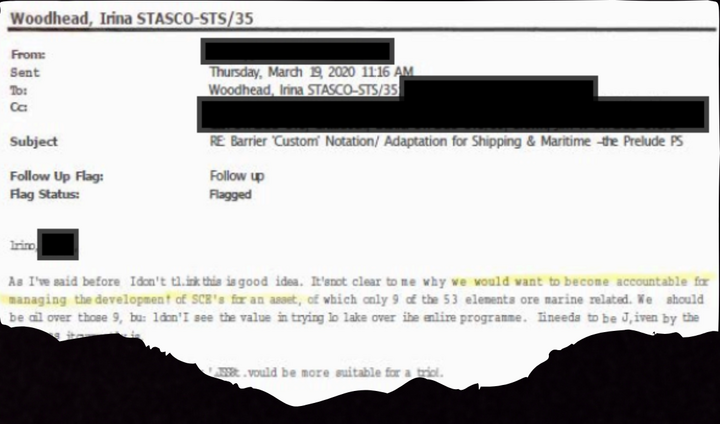
Being told by my supervisor that the system was "not a good idea" left me feeling deeply concerned and anxious because I considered it to be a fatal risk.
By mid-2021, she voiced her concerns to her Local Compliance Advisor about the adequacy of Shell's Asset Integrity Process Safety Management (AIPSM) in meeting Prelude's specific needs. This was escalated to Shell's Legal Counsel, who informed Maritime Governance and Assurance as well as her line management. She claims this chain of events had severe repercussions for her career at Shell.
As the facility's power demands increased, so did the challenges. However, instead of gaining support, Woodhead found herself caught in a complex process of procedural back-and-forth, where safety concerns became entangled with corporate procedures.
Despite pushback from her superiors, Woodhead was convinced that something was wrong. In response, they quickly placed her on a formal performance improvement plan (PIP), challenging her concerns and demanding she stop raising them.
Woodhead claims that Shell's HR department later cancelled the PIP, which had been implemented improperly, and reclassified it as 'informal' to prevent her from appealing the decision. To make matters worse, she alleges that the company revised corporate HR procedures to support this move, further complicating her ability to challenge the actions.

Woodhead says that as a last resort she looked to have her voice heard via Shell's independent alert platform, carefully documenting each step so far.
The reckoning
At the end of 2021, the Prelude facility had a fire, with a consequent power outage, which shut the facility down until April the following year, adding to the myriad of other issues seen since its inception in 2019.
At this point, things also started to impact Woodhead personally.
By March 2022, the stress had become overwhelming, and she was medically declared 'unfit for work' due to job-related stress.
Three months later, the same individuals who had dismissed her concerns assumed control of safety protocols—a bitter irony that only strengthened Woodhead's determination. She subsequently lodged a whistleblower claim with the London South Employment Tribunal against Shell International Trading and Shipping Company Limited. Her allegations encompass direct sex discrimination, harassment, victimisation, and detriment relating to both health and safety concerns and public interest disclosures.
Prelude's operational challenges continued. In December 2021, an electrical fault ignited a fire-related incident, leading to an emergency evacuation and a prolonged shutdown. NOPSEMA initiated an investigation, and Woodhead's earlier warnings appeared more justified than ever.
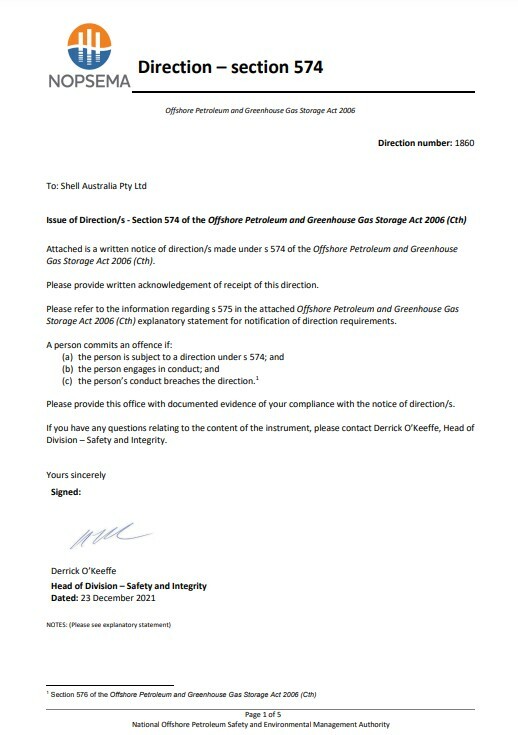
By March 2023, Shell terminated Irina Woodhead's employment due to misconduct. At a hearing on July 14 2023, the Employment Tribunal found Woodhead had repeatedly refused to engage with the Performance Improvement Plan and did not follow reasonable management instructions, leading to a breakdown in her employment relationship.
Emotional toll
The weight of Woodhead's story felt heavy. I sensed the exhaustion in her voice, the kind that comes from being worn down gradually. "How did you feel by the time Shell terminated your employment?" I asked as diplomatically as possible.
She stops for the briefest moment—barely a breath — "What, emotionally?" she asked without needing an answer. "By the time they fired me, I felt like I'd been emotionally raped," she says, her voice sharp.
Despite her fragile emotional state, Woodhead decided to confront Shell, focusing on her concerns about safety within the company. She aimed to prevent future disasters and ensure that safety standards were more than just corporate buzzwords. Although she had been praised for her significant progress during the pandemic in 2020, Woodhead felt she was suddenly marginalised, her reputation tarnished, and her career effectively over at the Shell London Centre, even as other Shell Group businesses sought her advice worldwide.
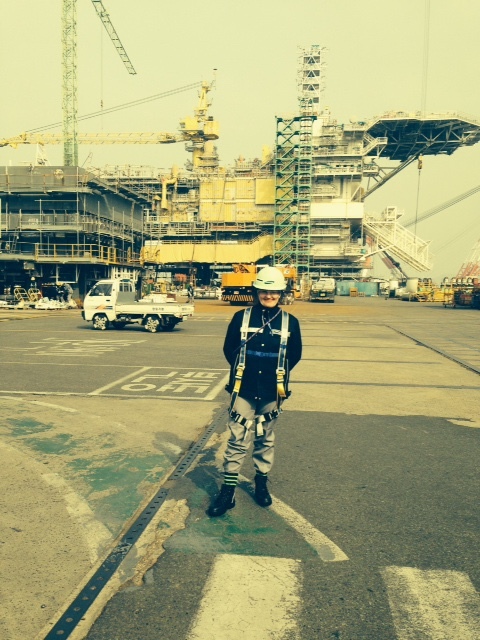
I felt like I'd been emotionally raped.
Falling hard
Woodhead claims Shell slammed the door on her—literally.
"One day, I was logging into the company's system as usual, and the next, I was cut off entirely," she says. "They put me on ‘gardening leave' to stop me having access to the company, then they turned up at my doorstep to take back my laptop and work documents—it was like the door slammed shut on my career, quite literally."
Forced into an uncertain financial situation, Woodhead sought interim relief again through the UK Employment Tribunal in May 2023, hoping to maintain some income at least while her whistleblowing claims were under review.
"Shell argued that I wasn't eligible for ‘protected disclosures', which meant I wasn't entitled to the legal protections meant for whistleblowers," she recalls. The tribunal sided with Shell just two months later, leaving Woodhead without employment and relying on her husband's support.
In 2023, she brought her case to the UK's Advisory, Conciliation and Arbitration Service (ACAS), a mandatory step before filing a new whistleblower claim. Undeterred, she escalated her concerns further in September of that year, launching fresh allegations of victimisation, discrimination, and wrongful dismissal. This time, her plight drew the attention of international observers and government officials, sparking growing interest in her claims and intensifying scrutiny of the situation.
Just the beginning
While many in Australia would have been enjoying a day off work, on January 26, 2024, on the other side of the world, Woodhead represented herself during a marathon six-hour preliminary hearing, elevating her legal battle beyond her personal situation. She framed her fight as a broader stand for others in the industry facing similar challenges. Despite Shell's initial objections, the Tribunal permitted her to expand her claims.
Following the rejection of her appeal for "Interim Relief" in September 2023, Woodhead was given a chance to present her case before a judge later that month with the aid of a pro bono solicitor. A ruling in July 2023 ensured her name remained public, even though the evidence had yet to be tested in court.
The emotional strain and financial burden were intense, but Woodhead drew strength from a tight-knit support network of family, friends, and professionals. Despite the personal cost, she remained resolute, refusing to allow Shell's influence or bureaucratic inertia to derail her efforts.
Her persistence began to attract wider attention. Woodhead's advocacy resonated with WhistleblowersUK, where she became an associate, actively contributing to their campaign for the Whistleblowing Bill. No longer just advocating for herself, she was shaping the future of whistleblower protections, gaining the attention of her local MP and relevant government bodies in the process.
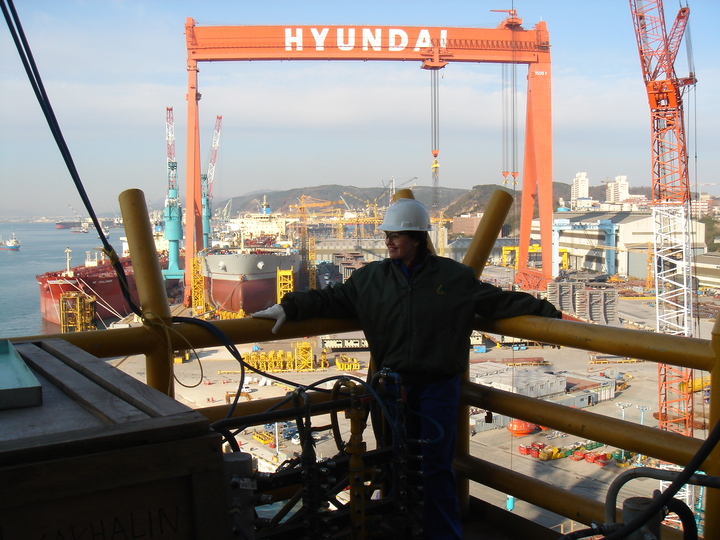
The high stakes of speaking out
Woodhead says that for Shell, the issues with Prelude were just another series of costly hiccups in the unpredictable oil and gas industry. However, for Woodhead, it was a fight for safety and survival.
"We're talking about people's lives here," Woodhead states, her voice unwavering. "When safety protocols are ignored, and the only thing standing between potential disaster and reality is a whistleblower, someone has to step up, even if it costs them everything."
And for her, it did. She faced financial strain, an emotional rollercoaster, and professional exile.
Nonetheless, Shell remains steadfast in its assertion Woodhead's dismissal had nothing to do with the concerns she raised. Instead, they point to the tribunal's interim ruling: "We have been clear about the merits of our case. The interim ruling from September 2023 supports that view."
Shell refutes whistleblower's safety allegations as Prelude FLNG tribunal nears
In a statement, Shell defended its response to the safety concerns raised by Woodhead.
"Woodhead has made claims that are currently under consideration by the UK employment tribunal, and we have been transparent about the merits of our position," the statement read. "The interim ruling from September 2023 supports this view."
The company also emphasised that the safety case for their Prelude FLNG has been accepted by NOPSEMA.
The tribunal will consider interim relief issues in a hearing scheduled for October 30. A final hearing date has yet to be set, with the next preliminary hearing expected to last three full days in December 2024.
ENB will be following Woodhead's efforts in her legal challenges.


